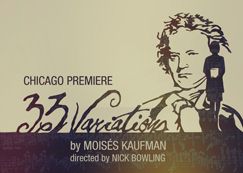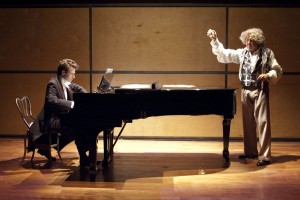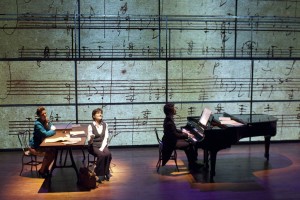MORE THAN JUST VARIATIONS ON A THEME
33 Variations starts out with a character asking the question, “Why did the great German composer Ludwig van Beethoven write 33 variations on a trivial little waltz by a mediocre amateur composer?” On the surface, the question itself may seem trivial, but playwright Moises Kaufman expands the mystery of the 33 variations into a drama that makes us all care. He explores the power of music, the ambiguity of history, the complex relations between a mother and daughter, the bravery and tragedy of fighting a fatal disease, and the many sides of friendship. So the scholarly problem of the variations is just a narrative hook for one of the most stimulating plays to hit Chicagoland theater in recent seasons, precisely what local patrons have come to expect from TimeLine Theatre Company.
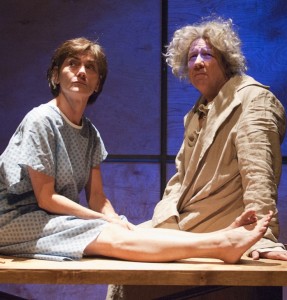 Kaufman writes 33 Variations on two chronological levels. One takes place in the early 1800’s with Beethoven in Bonn, Germany. The other is set today, as we follow an American music scholar named Katherine Brandt as she visits Bonn to examine archives that might hold the key to why Beethoven invested so much time and inspiration on the variations.
Kaufman writes 33 Variations on two chronological levels. One takes place in the early 1800’s with Beethoven in Bonn, Germany. The other is set today, as we follow an American music scholar named Katherine Brandt as she visits Bonn to examine archives that might hold the key to why Beethoven invested so much time and inspiration on the variations.
Kaufman’s dramaturgy takes us into Tom Stoppard territory, with separate storylines played out simultaneously by characters unaware of each other’s presence, sometimes speaking the same dialogue at the same time. As the story shuttles back and forth between today and the nineteenth century, the drama grows in narrative complexity to a poignant climax. While all these plot threads steam along, a pianist in full formal wear presides at a concert grand piano in the middle of the stage, performing excerpts from the variations to suit the moods of the narratives.
Brandt has more on her plate than trying to solve the riddle of Beethoven’s variations. She faces a prickly relationship with her daughter Clara, an intelligent young woman who can’t seem to find herself in life. More critically, Katherine is diagnosed with the incurable Lou Gehrig’s disease. Her life becomes a race against time as she tries to complete her Beethoven project before the disease overtakes her. Clara engages in a battle of wills with her stubborn mother over how to deal with the disease, but then the daughter’s life is unexpectedly complicated by an improbable romance with a male nurse named Mike, who is working in Bonn and involved in Katharine’s treatment.
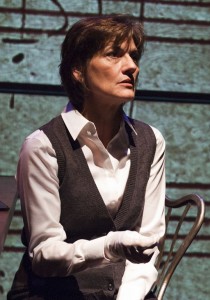 Back in the early nineteenth century, Beethoven throws himself into the variations, battling poverty and growing deafness and the importunities of his publisher Anton Diabelli, who composed the modest little waltz. Diabelli has signed up many of the great composers of the day to contribute a single variation on to the waltz for a commemorative publication, and Beethoven’s interminable delays threaten the enterprise with dire financial consequences. But Beethoven won’t be hurried, bullying his friend and secretary Anton Schindler as well as the hapless Diabelli.
Back in the early nineteenth century, Beethoven throws himself into the variations, battling poverty and growing deafness and the importunities of his publisher Anton Diabelli, who composed the modest little waltz. Diabelli has signed up many of the great composers of the day to contribute a single variation on to the waltz for a commemorative publication, and Beethoven’s interminable delays threaten the enterprise with dire financial consequences. But Beethoven won’t be hurried, bullying his friend and secretary Anton Schindler as well as the hapless Diabelli.
The play starts lightly, with Beethoven initially portrayed as a comical curmudgeon in a white fright wig. But the density of the themes take hold in the second act. Katherine’s research into Beethoven’s variations is based heavily on written evidence left behind by Schindler, but that evidence may be bogus, suggesting the historical record is so unreliable as to be unusable. Katherine becomes close friends with a German woman named Gertrude Landenberger, a curator of the Beethoven archives who plays an increasingly intimate role in Katherine’s life that ultimately stretches their friendship to the breaking point.
Kaufman is best known as the creator of two docudramas, The Laramie Project and Gross Indecency: The Three Trials of Oscar Wilde, both of which persuasively take in hand the subject of homophobia. Kaufman based these works on actual people, but 33 Variations is only partly built on real-life individuals. Beethoven did employ a secretary named Anton Schindler, and Anton Diabelli was an actual Viennese music publisher who wrote the little waltz that triggered Beethoven’s burst of creativity, but the play’s stirring emotional confrontations and literate and witty dialogue come from Kaufman’s pen, not from a historical record. Kaufman deftly interweaves the stories separated by almost 200 years, and their unification at the end of the play is as logical as it is tear-jerking.
Credit director Nick Bowling with a sureness of touch that keeps the complex storytelling accessible and absorbing. The cast, in the usual TimeLine tradition, is flawless. Janet Ulrich Brooks is first among equals as Katherine Brandt, an academic relentless in her pursuit of the truth behind the variations who becomes a heartbreaking case history of a strong woman, her body destroyed by disease but not her spirit or dignity.
Jessie Fisher turns the problematical role of Clara into dramatic gold, carving out a rich portrait of a young woman pulled in multiple directions with her difficult relationship with her mother, her inability to settle on a career, and her affair with Mike, a likable young man who initially seems underqualified for a woman of Clara’s intelligence and spunk. But as the play goes on, Ian Paul Custer allows Mike to grow into a worthy helpmate in Clara’s anguish over her mother’s deterioration as well as a sympathetic lover. The modern side of the play is completed by a fine performance from Juliet Hart as Gertrude Landenberger, who blossoms from a no-nonsense minor figure in Katherine’s scholarly quest to a woman of compassion and steely strength.
The performances are just as good on the nineteenth century side. Terry Hamilton, who never disappoints, is an entertaining and ultimately wise and affecting Beethoven for all his bluster and irritability; Hamilton illuminates Beethoven’s passion for his music in one breathtaking scene where he and the pianist join to feverishly dissect the musical components of the variations. George Lepauw (alternating with Igor Lipinski) is the impressive classical pianist who is onstage the entire performance. As Diabelli and Schindler respectively, Michael Kingston and Matthew Krause both turn their characters’”who are essentially comic foils for Beethoven’”into three-dimensional ones.
Mike Tutaj brings nineteenth century Bonn to life with his vivid projections. Brian Sidney Bembridge’s set consists of a bed on one side of the stage, the piano in the middle, and a table on the other side, but in combination with Tutaj’s visuals, it’s sufficient to establish a strong backdrop for the action. Alex Wren Meadows designed the costumes, notably the authentic looking nineteenth century outfits for Diabelli and Schindler. Keith Parham’s lighting and Andrew Hanson’s sound complete the fine physical production (although spectators close to the piano will find it occasionally competing with the dialogue).
review of 33 Variations on Broadway
photos by Lara Goetsch
33 Variations
TimeLine Theatre Company
Stage 773, 1225 W. Belmont
ends on October 21, 2012
for tickets, call 773.327.5252 or visit TimeLine
for more shows, visit Theatre in Chicago
